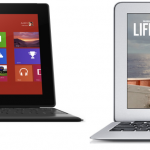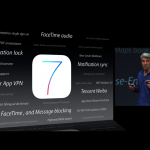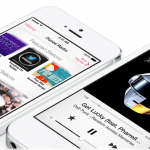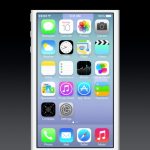How tech companies collect data on you, and what they do with it

Big Brother is watching you. Or rather technology giants like Google, Apple, Amazon, Facebook and Yahoo are. The firms track their users relentlessly, and use that information to provide a tailored online experience (and maybe share it with government agencies).
Baynote, which provides personalized customer experience solutions for multi-channel retailers, has put together an interesting visual insight into what data the tech titans gather about you, how it’s collected, and what purposes it’s put to.
Defending Apple

On June 30, the day after my most recent one-year contract expires with AT&T U-verse, I will cancel the service and cut the cord. Last night, while I watched some last-minute Prime Time before it's gone, Apple commercial "Our Signature" aired. The ad is a concise, tweet-like mission statement that encapsulates all of what the company's product design is about. The spot sums up all anyone need know about the fruit-logo company in 60 seconds.
"This is what matters. The experience of a product. How it makes someone feel. Will it make life better", the commercial begins. Yes. Yes. Yes. This is what I have written about Apple for a decade -- that the company's products and marketing are aspirational. That the design goal simply is to make people feel good, to inspire life will be better for choosing the Apple way.
Wi-Fi issues plague new Apple MacBook Airs

History repeats itself, as another Apple product has connectivity issues -- three years ago it was the iPhone 4 and now the new MacBook Air is affected. Disgruntled users have taken to the company's support forum to report the Wi-Fi connectivity woes, which appear to persist even on replacement units.
According to a number of reports, both MacBook Air models -- the 11.6-inch and the 13.3-inch versions -- are affected, including those which feature factory upgrades. Users say that the Wi-Fi connection randomly drops after a period of activity, with the problem mostly being reported when relying on non-Apple-branded routers. Judging by the posted replies, none of the solutions presented thus far appear to fix this.
Growing popularity of OS X attracts cybercriminals

Security specialist Kaspersky is warning of the increased vulnerability of Mac systems to malware. It points out that there are now more than 63 million OS X users in the world and that since 2010 the number of antivirus signatures for Macs has increased more than six times.
The top five threats include becoming part of a zombie network via a compromised WordPress site, fake antivirus products like MacDefender and MacGuard, exploitation of software vulnerabilities, targeted attacks and network infections.
Microsoft Surface Pro gets even stiffer competition from new 11.6-inch Apple MacBook Air -- which one would you buy?

To the untrained eye, this comparison appears to be moot. After all, the Surface Pro is a tablet and the 11.6-inch MacBook Air is, indeed, an ultrabook. Traditionally, the two types of devices rarely have anything in common. Tablets offer touchscreens, portability and great battery life while ultrabooks usually fail to deliver the same level of versatility. So how can one pit the Surface Pro against the smaller MacBook Air?
As my colleague Joe Wilcox explained almost seven months ago, the two devices actually have a great deal in common. The Microsoft-branded tablet kicks off at $899, can be coupled with a dedicated keyboard, has expansion ports, runs a fully-fledged operating system and, to its disadvantage, delivers pretty appalling battery life. The Apple-branded ultrabook packs similar hardware specifications, starts at $999 but offers a built-in keyboard from the get-go. And, in the meantime, the fruit company upgraded its device to Intel "Haswell" Core processors which provide a tremendous bump in battery life. Now, more than ever, choosing between the two is a very tough call.
Tech companies reveal details of NSA data requests

In the light of last week’s PRISM revelations the major tech companies have all been quick to deny that they allow the NSA direct access to their servers. But they have also said that they respond to lawful requests for data and have been revealing the numbers involved.
Apple says it received between 4,000 and 5,000 requests from US federal, state and local law enforcement agencies for customer data between December 1, 2012 and May 31, 2013. In its press release Apple says, "Regardless of the circumstances, our Legal team conducts an evaluation of each request and, only if appropriate, we retrieve and deliver the narrowest possible set of information to the authorities. In fact, from time to time when we see inconsistencies or inaccuracies in a request, we will refuse to fulfill it". Apple also says that certain types of data such as iMessage and FaceTime conversations along with Map searches and Siri requests are not retained in an identifiable form.
Hands on with Office Mobile for Office 365 Subscribers

As you’ll know by now, Microsoft today announced the launch of Office Mobile for Office 365, an iOS app which allows users to access, view and edit Word, Excel and PowerPoint documents -- provided you have an Office 365 subscription.
We took it for a spin and despite the limitations, were actually pleasantly surprised. There’s plenty of functionality in the app to explore. The app can view Office documents stored on SkyDrive, SkyDrive Pro, or SharePoint, for instance, as well as documents which arrive as email attachments. It syncs with your other Office 365 devices, too, so documents you’ve read elsewhere will appear on your phone’s Recent Documents panel, and when you open one it’ll resume at whatever point you left off.
Microsoft shouldn't do Office for Android

Seven months ago, when rumors burned hot, I explained why "Microsoft Office for Android and iOS is a Trojan Horse" -- that any mobile suite would be all about the cloud service. Sure enough, today Microsoft released the strangely named "Office Mobile for Office 365 Subscribers" to the App Store.
Office 365 is the productivity suite's future. Microsoft now claims to be a "devices and services" company. Smartphones are devices, Office 365 is a service and required for the iOS app. What more reasoning is needed? The Redmond, Wash.-based company provides more functionality than I predicted, but does so strictly in mobile context that doesn't diminish the PC product. That said, what Microsoft gives to iOS should be withheld from Android.
Office finally arrives on iOS, but with limitations

The much talked about iOS version of Microsoft Office finally arrives in the App Store today. While that sounds like great news for anyone hoping to at last be able to (officially) use Word, Excel or PowerPoint on the iPad, you may wish to curb your enthusiasm, as there are some serious limitations with this release.
It's only available in the US for starters (coming to other territories "soon"), and you need to be an Office 365 subscriber to use it. Also it's only optimized for the small screen.
Smartphone kill switch -- an evil theft deterrent

On June 13, 2013, a coalition of law enforcement, consumer groups and political leaders named “S.O.S” (Secure Our Smartphones), called for a “kill switch” to be installed in every smartphone. The concept of this kill switch is simple -- when a smartphone is stolen, the owner can have the device permanently disabled. Approximately 1.6 million people in the USA had a mobile device stolen in 2012 and a third of all robberies involves a stolen cell phone -- it is a serious problem. The hope is that overall smartphone theft would be reduced as a disabled device would be worthless.
While the concept makes sense from a law enforcement standpoint, the possibility of misuse and abuse is astronomical and threatens our liberty and freedoms. Once the kill switch is built into these devices, we lose a certain level of autonomy. There will be the potential for a government agency (domestic or foreign), corporation or hackers to disable our devices by using this kill switch for evil purposes. In other words: who will control the kill switch?
The iOS 7 features Apple didn’t mention at WWDC

There’s no question that iOS 7 is a sexy looking mobile operating system. Jony Ive and his team have done a fantastic job of reinventing and modernizing the interface, but the great news for fans of Apple products is iOS 7 isn’t all style and no substance.
Apple ran through a lot of the new or improved features yesterday, including Control Center, AirDrop, Photo app, Siri (with added Bing!), iOS in the Car, FaceTime Audio, and iTunes Radio. But there were features that Craig Federighi, SVP of Software Engineering, didn’t mention but which appeared on a slide in the background.
iCloud Keychain -- Will Apple hand your keys to the NSA?

Yesterday at WWDC, Apple announced iCloud Keychain. This is a password management service that utilizes Apple’s iCloud. It will allow users to sync their website login credentials, Wi-Fi passwords and credit card information across multiple devices (iOS and OS X) using 256-bit AES encryption. On the surface, it sounds like a great feature that would be very convenient for Apple users. However, the world has changed much since the PRISM scandal.
Ever since we learned that the US Government has allegedly infiltrated Apple, such a service is problematic. By storing all of your passwords with an NSA infiltrated company, you could be potentially compromising the security of all of your accounts. It could be especially bad to expose your Wi-Fi passwords as you could be compromising entire networks. While 256-bit encryption is a wonderful thing, it makes no difference if the NSA has direct non-encrypted access -- it would be understandable for users to be suspicious.
iTunes Radio is too little, too late

At WWDC, Apple's big annual show, the company finally announces iTunes Radio, a service rumored and bandied about around the internet for some time. Apple, as it is known to do, builds this up to be the be-all and end-all of everything that came before. Is it?
To answer that we must first delve into what iTunes Radio is. According to Apple, customers "have access to Featured Stations, stations inspired by the music you already listen to, and more than 200 genre-focused stations — including everything from Hard Rock to Doo Wop. Your stations evolve based on the music you play and download".
Apple reveals all new iOS 7 -- ‘defines an important new direction’

We all knew that Apple would be revealing a redesigned version of its mobile operating system today at the 24th Worldwide Developer Conference in San Francisco, and we've just been treated to an in-depth look.
As was widely reported, the Jony Ive designed iOS 7 has a flatter, functional design and the skeumorphism -- faux wooden bookshelves, green felt and the like -- that was a central theme in previous versions of the operating system is no more.
Apple reveals OS X 10 Mavericks -- no, seriously, that’s the new name

Live at WWDC 2013, Apple's Craig Federighi has just announced the first new non-cat named version of OS X 10.
After admitting Apple had run out of Lion variations, and making a joke about calling it OS X 10 Sea Lion, he revealed OS X 10.9’s real title -- Mavericks (named after the surfing location in Northern California rather than Tom Cruise’s character in Top Gun). Which is probably the worst name of any operating system ever. Even worse than Windows Me.
© 1998-2025 BetaNews, Inc. All Rights Reserved. Privacy Policy - Cookie Policy.